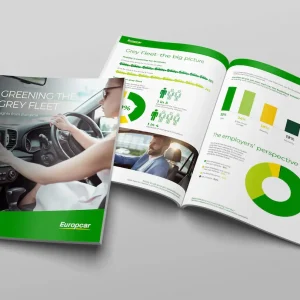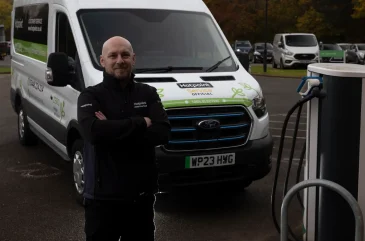
Cole Pemberton has spent the last three years as fleet manager at Hotpoint UK, now part of the Beko Europe Group. Before stepping into this role, Pemberton managed a team of field based service engineers across the south and southwest of the UK as an area manager. Now, Pemberton’s role is pivotal in overseeing the company’s service vans and cars, integral to Hotpoint’s daily operations.
Headquartered in Peterborough in the East of England, Hotpoint’s fleet management is a crucial aspect of its business.
Managing fleet the old-school way
Pemberton’s approach to fleet management is notably hands-on. “We’re quite an old-school operation,” he says. Unlike companies where fleet management is handled by HR or procurement, Pemberton has comprehensive control over Hotpoint’s service vans and company cars. His responsibilities include coordinating vehicle procurement, renewals and reissues as well as procurement of racking systems and branding for service vans. By keeping costs lean, Pemberton’s team ensures efficiency—engineers fit spare parts where possible themselves, minimising external body shop visits.
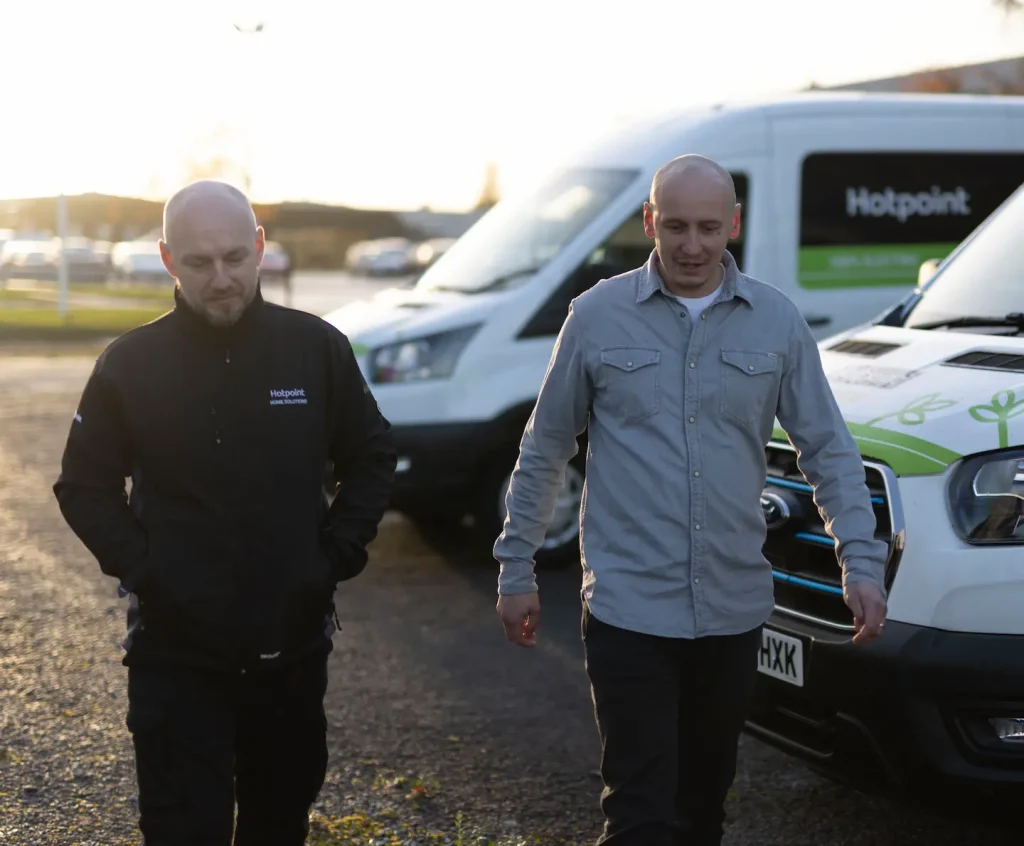
Small but mighty
Pemberton doesn’t do it all alone. He has a small but effective team, each member handling specific tasks to keep the fleet running smoothly. Louise, for example, manages company car issues. “Company car drivers can be notoriously emotional about their cars,” Pemberton jokes, “but Louise has the diplomacy to deal with those concerns, from fuel cards to tyre issues.” Fuel management is crucial, given that Hotpoint UK used £2.3 million of fuel last year. Louise also produces regular newsletters on important topics such as road safety and vehicle maintenance.
His other team member, Callum, handles driver onboarding, ensuring new vehicles are entered into the fleet software and covered by insurance, while also managing accident notifications. Whilst Carl, the onsite garage technician ensures vans are checked over ready for reissue and old vans stripped for return to the lease company at the end of their contract. “My job is to ensure that all of these moving parts work seamlessly together,” Pemberton explains, “and develop a strategy for our transition to electric vehicles.”
Managing a complex fleet
Hotpoint’s fleet is diverse, encompassing over 200 company cars for a variety of managers across the UK & Ireland as well as over 800 service vans, primarily medium-sized Ford Transits. Recently, Hotpoint made significant strides into electric vehicles, introducing 40 electric Transit vans and expanding to 66 fully electric cars and 130 hybrids with a further 30 electric vans due to arrive imminently. Pemberton’s efforts in this transition were pivotal, despite initial challenges in managing electrification without precedents in the company.
“Our car drivers’ use cases are quite diverse,” Pemberton explains. “We have around 40 area managers who oversee engineer teams, as well as senior managers and directors—mostly office-based—with perk cars. At the operational level, there are many in sales who travel to meet vendors and retailers, ensuring our product placement is spot on.” In total, the fleet includes 130 job-need vehicles, with the rest comprised of managers, senior managers, and directors.
The vans are primarily used by our excellent field service engineers, with just a handful dedicated to home deliveries. “The vast majority of our fleet consists of medium-sized, Ford Transit Customs,” Pemberton says.
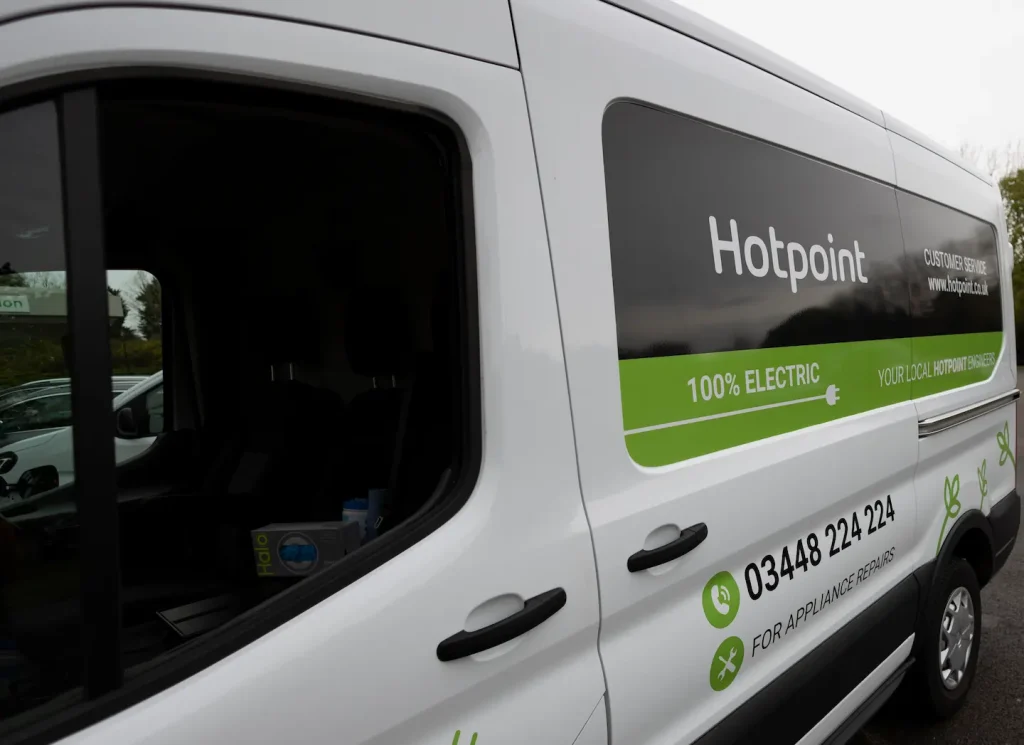
The first foray into electrification
Hotpoint UK has recently taken a significant step toward electrification with the introduction of 40 electric Ford Transit vans in 2023. Pemberton led this transition and reflects on the challenges of integrating EVs into the fleet.
When Pemberton first took on his role, managing the fleet was a complex task. “I knew how to manage a budget, but fleet management was a whole new world,” he recalls. Electrification was a key early challenge, as it was a new initiative for Hotpoint. “I had to order electric vehicles, but first learn everything I could about them, without an existing platform or policy in place for this new vehicle type,” he says.
The switch to EVs presented challenges for drivers used to traditional vehicles. “Some had never driven an automatic or electric vehicle,” Pemberton notes. “Adjusting to a silent, different driving experience was a significant shift.”
Drawing from his engineering background, Pemberton designed the racking for the vans with the support of Gemma from Sortimo, based on stock measurements and our engineers’ needs. “The transition wasn’t too difficult once we found the right vehicle,” he explains.
However, the major challenge has been the infrastructure. Many engineers are not able to have chargers installed at home, and the cost of external charging is high. “We cover 100% of the cost of chargers, but there are challenges with newer engineers renting or sometimes living with their parents. We provide BP fuel and charge cards as a temporary on the road solution,” Pemberton adds.
Looking ahead, Pemberton considers hybrid vehicles as a more practical option in the short to mid term. “We’re exploring plug-in hybrids, like Ford’s new models, which self-charge. This could eliminate some of the need for home chargers,” he says.
Hotpoint aims for a 50% electric fleet by 2030, but supply issues have complicated this goal. “We wanted a full Ford fleet, but the market didn’t have the options we needed which initially delayed our transition time,” Pemberton notes. This also affected racking configurations and telematics choices. “Strategy is important, but it must adapt to real-world challenges.”
Despite these hurdles, Pemberton is committed to Hotpoint’s sustainability goals. “Most of our car fleet is now electric or hybrid, with only about 20 diesels left,” he says. Eventually, diesel vehicles will be phased out, in favour of PHEVs and EVs.
While Pemberton is enthusiastic about EVs, he remains pragmatic about their impact. “Electric cars are not a silver bullet for sustainability,” he notes. “My job is to find the best solutions for the business and reduce CO2 and emissions where possible. We need to consider the entire lifecycle of these vehicles.”
After testing numerous electric vehicles, Pemberton found the Ford E-Transit to be a viable option. “It wasn’t perfect, but it was a great stopgap while waiting for the newer E-Transit Custom to be released,” he says.
As Hotpoint UK moves forward under the ownership of Beko Europe, Pemberton is dedicated to leading the fleet toward a more sustainable future. With EVs central to his strategy, he’s committed to reducing the company’s carbon footprint and making the transition as smooth as possible. For Pemberton, it’s all part of the job.
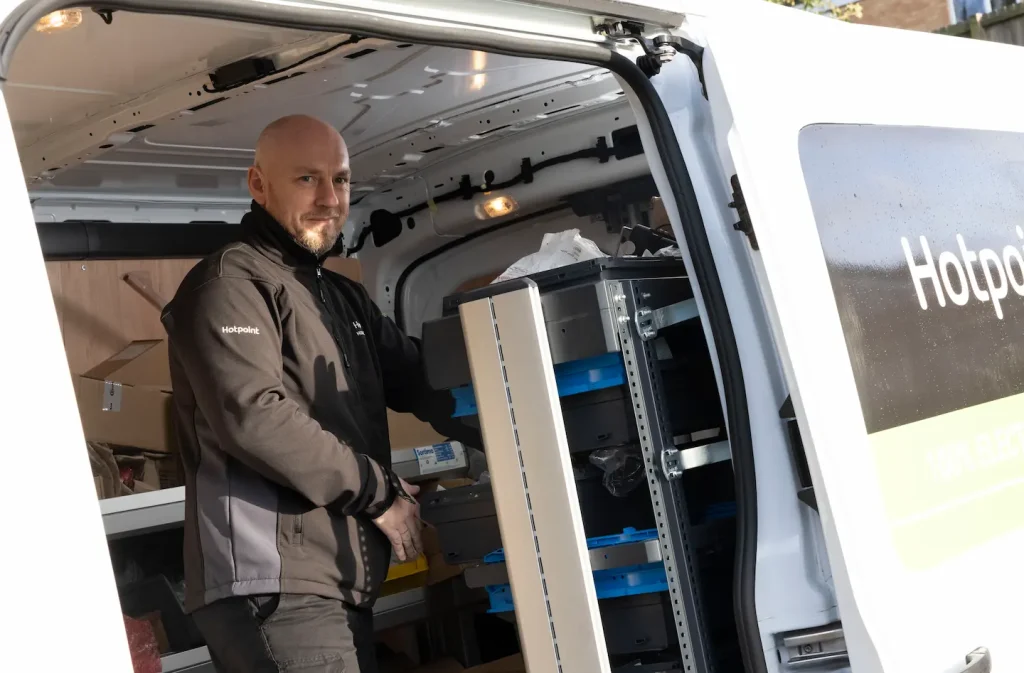
The evolving role of the fleet manager
Pemberton quickly discovered that fleet management is more intricate than it seems. “A lot of people don’t realise how involved it is,” he says. “I spend a week and a half each month just on invoicing—handling eight suppliers across two markets, managing both cars and vans. Then there’s ensuring the right vans go to the right engineers at the right time, negotiating contracts, and handling escalations of servicing and repairs.”
Managing Hotpoint UK’s fleet goes beyond just distributing vehicles, especially with the shift to electric ones. “Electric vehicles require a different focus,” Pemberton notes. “I handle everything from ensuring the right vehicles are assigned to the right engineers in the right geographic areas to negotiating with leasing companies and OEMs.”
One major change Pemberton implemented was fleet software across European markets. “Everything was on Excel spreadsheets when I joined,” he explains. “Implementing fleet software streamlined the process.”
Pemberton quickly recognised the need for smarter, more efficient management. “If something doesn’t make sense or is done purely because it’s always been that way, it’s probably outdated,” he says.
Fleet management, once seen as a secondary concern, is now crucial. “It was a dirty word in the room, focused solely on bottom line costs,” Pemberton says. “Now, my decisions have a significant impact on the business. I’m very fortunate that my manager and the business leaders understand this and see not only the challenges but the future opportunities.”
The changing age profile of engineers is also influencing vehicle choices. “Younger engineers need vehicles that align with their preferences,especially around powertrain, which may cost more,” Pemberton explains. “With everything going hybrid or electric, we must justify these costs.”
Fleet management now also involves treating people differently. “We need to accommodate engineers’ needs, including time for charging their vehicles in some cases,” Pemberton says. “We can’t deny overtime for searching for a charger.”
The role of fleet managers is also evolving within companies. “Fleet is becoming more comprehensive,” Pemberton notes. “Companies are hiring dedicated fleet managers again, who must engage with the industry. For engineers, managing a fleet involves working with HR and procurement to update policies.”
Pemberton finds this comprehensive involvement both challenging and rewarding. “I enjoy fleet management because it covers many aspects, and you need to understand everyone in the business,” he adds.
Making every penny count
As fleet costs rise, Pemberton is finding innovative ways to manage financial pressures. “It’s not just about saving costs; often, it’s about avoiding unnecessary expenses,” he explains. “If tyres cost £120, that’s a fixed expense. The challenge is managing rising costs within a set budget or trying to avoid that expense in the first place by proactively engaging with the drivers over simple things like tire pressure checks.”
Leasing costs for vans, which once ranged from a few hundred pounds, have soared under Pemberton’s management. “Post-Covid, prices have risen nearly 10% every six months,” he notes. A van that previously cost £200 now costs in excess of £450—a dramatic increase driven by changes in vehicle policies and reduced discounts on diesel models as manufacturers are mandated to sell electric vehicles.
To manage these costs, Pemberton has adopted several strategies. For instance, instead of an annual mileage limit of 17,500 miles, they now use 17,000 miles to ensure the vehicle doesn’t reach its 70k service threshold too soon, reducing maintenance costs. To accomplish this requires work with other functions that plan engineer working routes thus reducing daily travel.
However, Pemberton acknowledges that shifting costs around has its downsides. “You can’t keep shifting costs without consequences,” he says. “There are always additional charges, like excess mileage fees. Vehicles in low-mileage areas like London benefit from less wear and tear but often cost more at the end of their contract due to body damage.”
Anticipating unexpected expenses is also crucial. “Replacing a windscreen on a new Ford Transit Custom now costs significantly more, compared to older models,” he reveals. “I’ll need to adjust my budget to account for such costs, since these are classified as accident damage.”
Fuel prices add another layer of complexity. “Our budget might anticipate a specific cost per litre, but real-world costs can vary wildly without a strict policy on where to purchase fuel, there are of course geo political variables to that effect price,” Pemberton says. “I plan to set the budget higher to cover expected increases, and hopefully we will benefit from any surplus if prices are lower.”
Through these strategies, Pemberton is adeptly navigating fleet management, focusing on adaptability and proactive planning to keep Hotpoint UK on top of its fleet costs despite the evolving challenges.
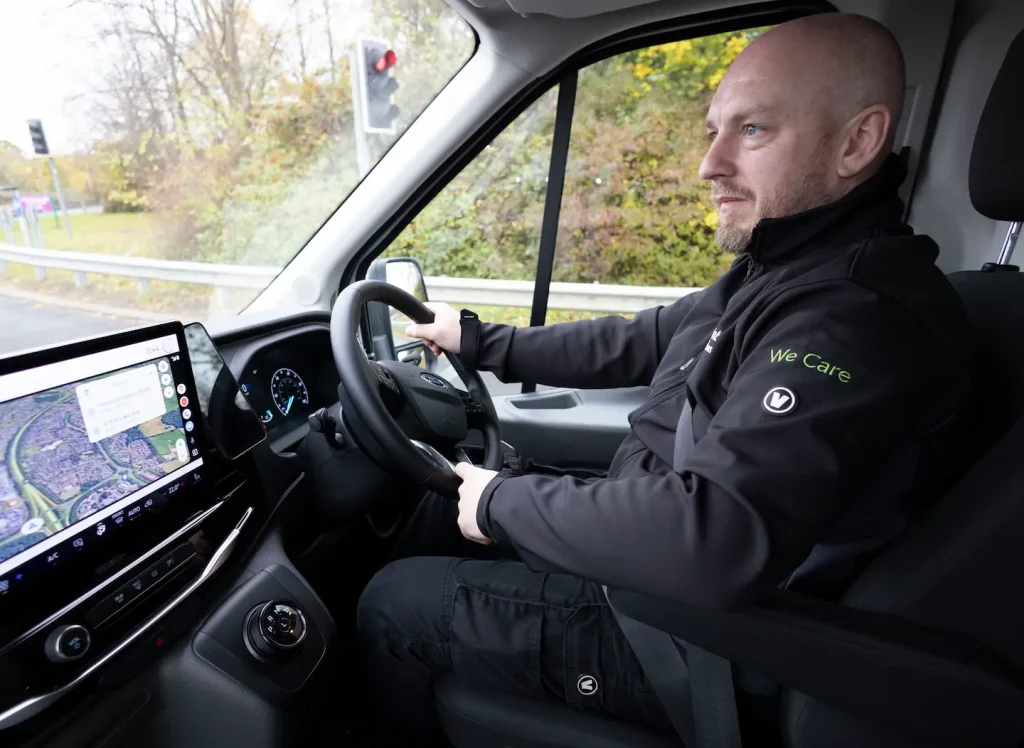
A future for hydrogen?
Pemberton reflects on the future of hydrogen and alternative fuels, drawing from his experience on various advisory boards. “Hydrogen shows potential, but realistically, it looks more suited for HGVs,” he explains. “Hydrogen is required to create electricity and power the vehicle, but transporting and refueling it remains challenging. Though BP is investing in hydrogen infrastructure, stations will be limited to major routes, and I suspect it will be a long time before you see one in local towns.”
While acknowledging hydrogen’s promise, Pemberton is more intrigued by Hydrotreated Vegetable Oil (HVO). “HVO is a little more expensive and currently does not appear widely available. It can be stored, which suits some business depots but as yet is not yet stocked with regularly used service stations. Despite being marketed as net-zero/neutral, it still emits CO2 but does offer considerable net CO2 reductions over its lifecycle.
Pemberton is cautious about hydrogen’s progress. “We’re no further with hydrogen technology than we were 15 years ago in my personal opinion. It remains a buzzword, but processing, transporting, and storing hydrogen is complex and costly. People often underestimate these challenges.”
Pemberton has been closely monitoring fuel costs, analyzing data from the fleet. “If all our engineers had used BP stations instead of third-party ones, we could have saved close to £300,000 in 2023,” he says. With fleet growth due to acquisitions, these savings are expected to increase.
To address this, Pemberton explains, “We now track fuel invoices to identify the closest BP station to each refuel. We need to address this discrepancy.” He notes that changing behaviour is a challenge, as engineers often choose the nearest station that is convenient, even if it’s not preferred by the business.
In addition to fuel efficiency, Pemberton highlights another issue: “At times we’re losing up £24 per week on some engineers due to idling—sitting in vans or talking on the phone during breaks.” Addressing these inefficiencies is crucial as the company optimises its growing fleet.
Looking ahead, Pemberton’s proactive approach underscores his commitment to navigating the evolving landscape of fleet management. By embracing innovation, tackling cost challenges head-on, and fostering a culture of continuous improvement, he is steering Hotpoint UK towards a more sustainable and efficient future. The journey is ongoing, but with Pemberton at the helm, the company is well-equipped to meet the demands of tomorrow’s fleet.



